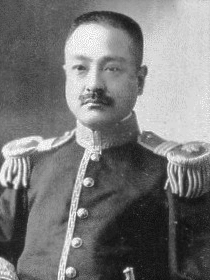Enkichi Ōki
Japanese politician From Wikipedia, the free encyclopedia
Count Enkichi Ōki (大木 遠吉, Ōki Enkichi, September 19, 1871 – February 14, 1926) was a Japanese statesman in the Taishō period.

Ōki was born in Tokyo. His father, Ōki Takatō was one of the leaders in the Meiji Restoration, and served in numerous cabinet posts in the early Meiji government. In 1899, Enkichi succeeded to his father’s title of count (hakushaku) under the kazoku peerage system. His political career began in 1908, when he was elected to the House of Peers. He initially supported the Kenkyūkai, but soon switched his allegiance to the Rikken Seiyūkai. He was appointed Justice Minister under the cabinet of Prime Minister Hara, a post which he also held under the succeeding Takahashi administration.[1] In 1923, he cooperated with Home Minister Tokonami Takejirō to introduce tightened anti-subversive legislature in response to increasing leftist agitation in the labor disputes, and the public emergence of the Japan Communist Party.[2] Ōki was subsequently Railroad Minister under the Katō and Kiyoura administrations.[3]
References
- Minichiello. Sharon. Japan's Competing Modernities: Issues in Culture and Democracy, 1900-1930. University of Hawaii Press, 1998 ISBN 0-8248-2080-0
Notes
Wikiwand - on
Seamless Wikipedia browsing. On steroids.
